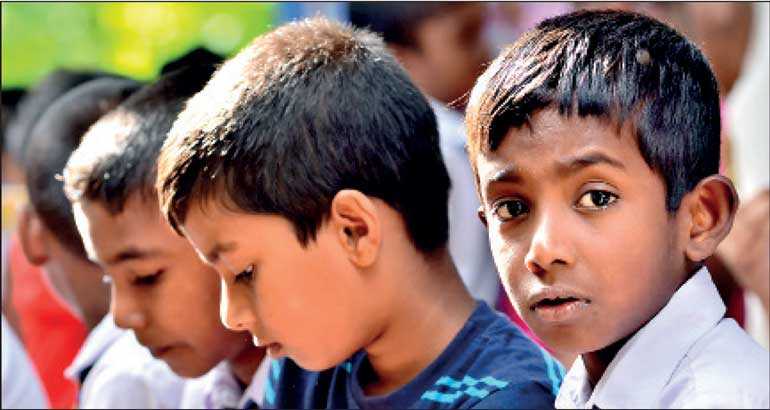Thursday Feb 19, 2026
Thursday Feb 19, 2026
Friday, 15 May 2020 00:00 - - {{hitsCtrl.values.hits}}

It is two months since students in Sri Lanka had any face-to-face learning. The outbreak of the COVID-19 pandemic has forced schools and higher educational institutions to a halt, rendering academic  calendars futile.
calendars futile.
We still do not know when schools and universities might re-open. But increasingly, the University Grants Commission and many educational administrators are pushing online education as the only solution for these times. While some teachers are embracing the directives on online teaching and learning coming from the top, others worry about such decisions being taken in haste, and implemented without wider consultation.
Widening educational inequalities
The free public education system, introduced in Sri Lanka in 1943 from primary up to tertiary levels, created and ensured increased educational opportunities and access for students from economically marginalised families.
At the heart of this system is the traditional classroom which, despite the many institutional and regional disparities, has functioned as a leveller to some extent, bringing students from different economic and cultural backgrounds to a common, shared space. From what we know, physical distancing is going to be inevitable for weeks and, very likely, months to come. In this circumstance, the introduction of online education shifts a significant portion of learning to the student’s home.
Online teaching excludes students who do not have the economic wherewithal to purchase the equipment necessary to connect with their peers and teachers. How many homes from where our students come have electricity and undisrupted internet connectivity? When many working-class families are struggling to find money to feed themselves, can we overburden them with the additional responsibility of purchasing internet data for their children’s education? How many of our students have a learning environment within their homes that is free of disturbance from other members of their families? Have we factored in these realities while hurriedly shifting to online education?
If the Government sees online education as the only way-out, it should take steps to eliminate the cost for both students and teachers by providing the equipment and connectivity. In the least, the shift to online education should not lead to aggravating the inequalities already entrenched in our educational settings.
Further, it is important to address the debilitating economic hardships of thousands of families by expanding the midday meal program, raising the Mahapola payment and increasing student housing. Such measures will ensure students from poor households actually continue their education.
Appropriate pedagogies
With this shift towards online learning, teachers are often shamed for not being tech-savvy, as though the issue at hand is merely about acquiring new technological skills. Distance learning need not be restricted to digital platforms alone. The pedagogies adopted by some online sites individuate students, oversimplify their understanding of complex socio-political issues, enslave students to technology and above all, reduce education to a skill that can be purchased online.
The curricula designed for traditional classrooms under normal circumstances cannot be superimposed on teaching practices undertaken online during a pandemic. An education that fails to resonate with our everyday life, especially when we are facing a crisis of momentous proportions, will only become an additional burden for the student, her parents and teachers. Instead of racing to complete the syllabus, devoting time to discuss the pandemic, its impact on our societies, economies and the state, and the measures that can address the post-pandemic context should be encouraged.
We must evaluate the appropriateness of the online platforms and the curricula taught to the vision of education that guides our activities as teachers and learners. Education is not simply about serving individualistic, market-dictated beliefs. At a fundamental level, education must equip us to make sense of the world, by critically processing our histories and current experiences, to make it better and more just for all, particularly those on the margins of our societies. The current disruption to education could be an opportunity to reflect and experiment, using already available resources, with alternative pedagogies that promote critical thinking, not one confined to narrow curriculum-compliance.
Education, at what cost?
A thoughtless adaptation of online learning and teaching poses a greater risk of further commercialising education, where the desire for profits will outweigh the desire for social transformation. A central tenet of the philosophy of free public education is that, under no circumstance, should education become a marketable commodity that can be exploited to make commercial profits.
In many countries, the states do not see it as their responsibility to design appropriate online education platforms and have permitted private companies to create them. Even before COVID-19, investments in global education technology companies reached approximately $ 19 billion in 2019. With the surge in online learning after COVID-19, edtech companies have realised unprecedented growth.
For example, the leading Indian company BYJU saw a 200% increase in usage. Companies invested in educational services not only look to advance their business interests, but also control and manipulate the ways in which educational activities take place. When profit is prioritised, at the expense of the transformative and justice-oriented educational goals, then the sphere of education spawns new inequalities while exacerbating the existing ones.
Opting for online learning may pave the way for commercial interests to enter the free public education space in Sri Lanka, introducing a dependency on businesses for educational activities and curtailing its academic autonomy. The pressure to open the education sector for foreign investments will intensify for the Sri Lankan State facing an economic collapse. Indoctrinated by the IMF and World Bank, the economic policies that Sri Lanka has adopted in the past five decades have failed to prioritise education in government spending.
Embracing online learning platforms can make it easier for the State to justify its future decisions to reduce spending on education, especially in areas like physical infrastructure and human resources. Indeed, the shift to online learning goes hand in hand with commercialisation and cost-cutting measures.
Rethinking free public education
No online platform can ever replace the vibrant classroom dynamic. The classroom is not just a space for learning, but it is also a site where students interact with one another across the social and cultural boundaries that separate them and build lasting bonds, friendships and solidarities.
The physical campuses of the universities in Sri Lanka, albeit disappointing as hotbeds of ragging and narrow nationalist politics, have also seen many legitimate struggles. It is in these spaces that our students and teachers have powerfully raised their voices against privatisation of education, political oppression and passionately debated various socio-political issues that affect their lives and the communities they come from. The measures taken today to address the challenges caused by the pandemic should in no way damage this shared physical space that have nourished our ideas and conversations over the decades.
Even as we appreciate the role conventional classrooms have played in creating a sense of equality among students, the pandemic urges us to re-evaluate some of our assumptions about free education under normal circumstances.
The glaring inequalities among students, now more visible as we move to online education platforms, should propel us into reflecting on the ways in which student participation in the traditional classroom even under normal circumstances is shaped by the socio-economic conditions of their homes and other social spaces they occupy. Their participation depends on nutrition they can afford, the time and space available for them in their homes to read, do their homework, relax and engage in recreational activities, the convenience created by transportation between home and school and their place in a society divided along lines of caste, class, gender and ethnicity.
The pandemic makes it even more evident that free education cannot be described in narrow terms as providing everyone education for free. For free education to become truly transformative, the State should take robust measures to ensure that students do not find themselves in unequal situations in all spaces that they occupy.
(Niyanthini Kadirgamar is a PhD student in Education at the University of Massachusetts, Amherst. Mahendran Thiruvarangan is attached to the Department of Linguistics & English at the University of Jaffna.)